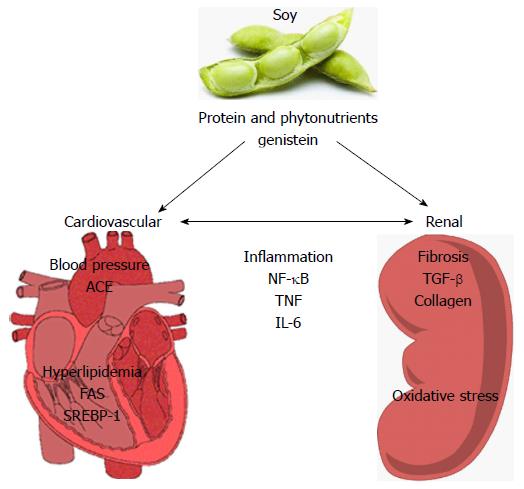Copyright
©The Author(s) 2016.
World J Nephrol. May 6, 2016; 5(3): 233-257
Published online May 6, 2016. doi: 10.5527/wjn.v5.i3.233
Published online May 6, 2016. doi: 10.5527/wjn.v5.i3.233
Figure 1 Potential mechanism(s) of soy-based renoprotection.
Soy protein has been shown to have effects on the cardiovascular system, as well as direct renal effects, that improve renal function. The actual components of soy that mediate these effects are unclear; but some data suggest a contribution of soy isoflavones, including genistein. Lowering of blood pressure may occur via decreased angiotensin-converting enzyme levels. In addition, soy improves the lipid profile, putatively via a decrease in lipogenic pathways demonstrated in animal models (e.g., FAS and transcription factor SREBP-1). The anti-inflammatory effects of soy may occur systemically, or within the kidney; animal studies have shown decreased NF-κB, TNF-α and IL-6 expression. Soy protein decreases renal fibrosis, possibly via a reduction in TGF-β signaling. There is also data suggesting that soy improves oxidant defense mechanisms in the kidney. Targets shown in italics have only been demonstrated in animal models. FAS: Fatty acid synthase; ACE: Angiotensin-converting enzyme; SREBP-1: Sterol regulatory element-binding protein 1; TGF-β: Transforming growth factor-β.
- Citation: McGraw NJ, Krul ES, Grunz-Borgmann E, Parrish AR. Soy-based renoprotection. World J Nephrol 2016; 5(3): 233-257
- URL: https://www.wjgnet.com/2220-6124/full/v5/i3/233.htm
- DOI: https://dx.doi.org/10.5527/wjn.v5.i3.233









